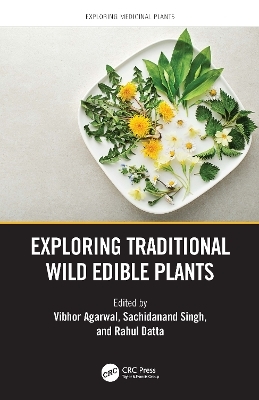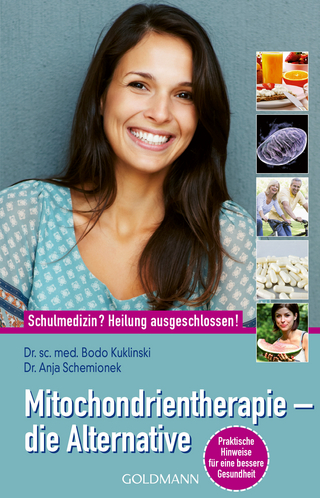
Exploring Traditional Wild Edible Plants
CRC Press (Verlag)
978-1-032-49886-7 (ISBN)
- Noch nicht erschienen (ca. Februar 2025)
- Versandkostenfrei
- Auch auf Rechnung
- Artikel merken
Wild edible plants are native species that grow and reproduce naturally in their natural habitats without domestication. These plants can serve as a healthier alternative to farmed crops that may be heavily laden with pesticides and other poisonous substances. This book focuses on assessment of the nutritional value, potential health benefits, and mechanisms of action of various wild edible plants. It presents information on nutrients and bioactive ingredients that can have health advantages, including antioxidant properties, antimicrobial, anti-inflammatory, and antidiabetic effects.
Features:
Comprehensive exploration of potential benefits as well as side effects of wild edible plants.
Special emphasis is placed on diversity, category, and pharmacological values of wild edible plants.
Discusses challenges regarding the usage of wild edible plants such as overharvesting and habitat destruction, safety, and toxicity.
A volume in the Exploring Medicinal Plants series, this book highlights bioactive compounds and therapeutic efficacies of various wild edible plant species. It is useful reading for scientists, researchers, and academia interested in the health benefits of wild edible plants as well as plant scientists.
Dr. Vibhor Agarwal is currently an assistant professor in School of Science and Mathematics at Emporia State University. Previously, he served as a visiting assistant professor at The College of Wooster and as a postdoctoral researcher at the University of Dayton. He earned a PhD from The Ohio State University and an MSc from Indian School of Mines. He has been the recipient of several prestigious awards such as the Junior Heiskanen Award from OSU Graduate School, Graduate Fellowship from OSU Graduate School. He is also the recipient of Erasmus Mundus scholarship for a semester study abroad program at KTH Stockholm. He has several research papers in international journals of repute. He has also collaborated on research related to soil sciences, plant science and food production. Dr. Sachidanand Singh is currently an associate professor at Pandit Deendayal Energy University. Previously, he was the head of the Department of Biotechnology, Sankalchand Patel University, India. He has completed B.Tech biotechnology, M.Tech bioinformatics, and PhD in bioinformatics. He has postdoctoral research experience from the College of Pharmacy, The Ohio State University, USA. His specialization area includes plant biotechnology, systems biology, and drug design. He has more than 12 years of research and academic experience. Dr. Singh has served for a decade in the School of Biotechnology and Health Sciences, Karunya University, Coimbatore, Tamil Nadu, India. He also worked as a consultant for the College of Pharmacy, The Ohio State University in statistical genetics in 2018. He has published more than 38 research articles in peer-reviewed journals and completed one SERB, goverment of India funded project, and two university research grant projects. He has received several awards in his area of research and for his teaching strategies. He has organized different conferences and workshops and received goverment funds for the same. Dr. Singh has shared his area of expertise with colleges and universities as an invited speaker at various conferences and workshops. He has guided 36 B.Tech and 10 M.Tech projects. Presently 6 PhD students are enrolled under him and 2 PhD completed are working in the field of herbal products, drug design, and integration with network biology. He has completed two book proposals on phytopharmaceutical and green technology under the umbrella of Taylor & Francis Group and Springer respectively. Dr. Rahul Datta is an assistant professor in the field of soil science currently is working at Mendel University in Brno, Czech Republic. His research is focused largely on increasing crop productivity using green and sustainable methods. Some of the most notable problems he has addressed through his research are drought stress, heavy metal toxicity in soil, and climate change greenhouse gas. His research has helped to increase the quality and productivity of staple crops such as wheat, maize, barley, rice, and other crops including mangoes, spinach, and cotton. His work has been cited in excess of 3000 times by researchers from all over the world, including research groups at major national institutions in the United States, such as the USDA. He reviewed over 400 papers in peer-reviewed journals and published approximately 115 articles in peer-reviewed journals. Additionally, he is an editorial board member of the journals BMC Plant Biology, Sustainability (MDPI), BMC Plant Biology, and Open Agriculture, in which he is overseeing a special issue on current trends in agriculture (MDPI).
1. Ethnobotanical Review of Wild Edible Plants. 2. Modern Approaches in Identifying Medicinal Wild Edible Plants. 3. Efficacy versus toxicity of wild edible plants: An inherent contradiction. 4. Current research in phytonutrient potential of wild edible plants. 5. Wild edible plants and the importance of vitamins as a constituent. 6. Solanum and Asparagus oils are good sources of omega fatty acids. 7. Wild edible plants as alternate food sources and agents of food security. 8. Cancer Drug Development from the Wild Edible Plants: Needs and Current Status. 9. Dandelions: Ethnopharmacology, Phytochemistry and Pharmacological activities for human wellness. 10. Consumption of Mushroom as a food source: Overview, health benefits and safety. 11. Mimosa caesalpiniifolia Benth., a Brazilian Caatinga species with anti-hypertensive properties: developing a pythomedicine from its inflorescences. 12. Ethnobotanical review of wild edible plants in Serbia. 13. Nutritional, Pharmaceutical and Antinutritional properties of Wild Edible Plants: What have we learned from the Mediterranean diet. 14. Parkia speciosa Hassk.: A medicinal plant from the wild.
| Erscheint lt. Verlag | 12.2.2025 |
|---|---|
| Reihe/Serie | Exploring Medicinal Plants |
| Zusatzinfo | 36 Tables, black and white; 37 Line drawings, black and white; 13 Halftones, black and white; 50 Illustrations, black and white |
| Verlagsort | London |
| Sprache | englisch |
| Maße | 178 x 254 mm |
| Themenwelt | Sachbuch/Ratgeber ► Gesundheit / Leben / Psychologie ► Alternative Heilverfahren |
| Medizin / Pharmazie ► Allgemeines / Lexika | |
| Naturwissenschaften ► Biologie ► Botanik | |
| Technik | |
| Weitere Fachgebiete ► Land- / Forstwirtschaft / Fischerei | |
| ISBN-10 | 1-032-49886-2 / 1032498862 |
| ISBN-13 | 978-1-032-49886-7 / 9781032498867 |
| Zustand | Neuware |
| Informationen gemäß Produktsicherheitsverordnung (GPSR) | |
| Haben Sie eine Frage zum Produkt? |
aus dem Bereich


